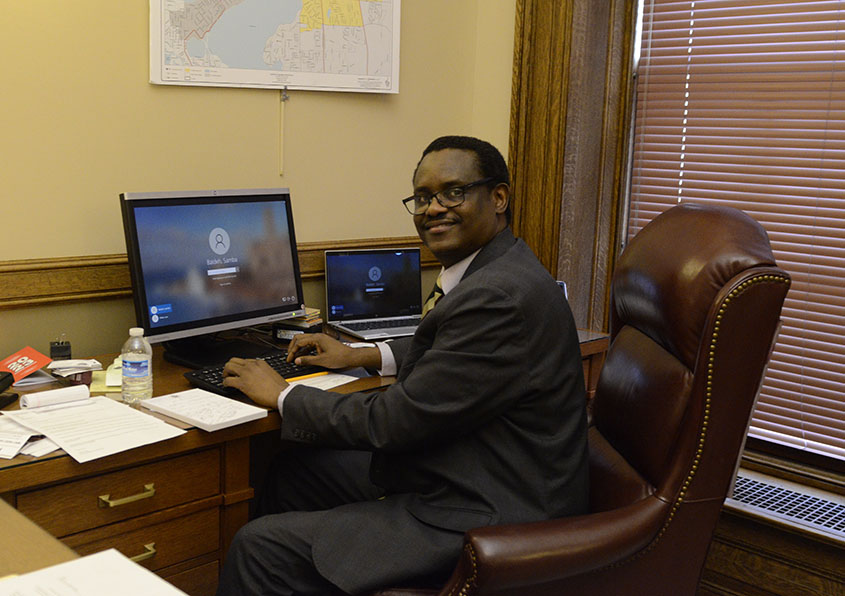Former student, now state representative serves in many ways
May 2, 2023
It all started with curiosity. Representative Samba Baldeh has alway had an unstoppable need to know.
The 2007 Madison College graduate’s story begins in a village in Gambia, Africa’s smallest country with a population of 2.64 million. It sits on a narrow strip surrounded by Senegal, and, like 95% of the people, Baldeh is Muslim.
He lived in a tiny remote village of Choya, without schools, banks or birth records.
Despite living in an under developed country, the humble beginnings of this village have brought Baldeh leadership and a life he never imagined.
Baldeh’s father, who died when he was four, left the family with many cows, goats and chickens, a valuable bartering chip within the community. In addition to his supply of animals, his family lived on subsistence farming.
The middle of nine siblings, Baldeh doesn’t have a birth certificate. Based on what his mother told him about the current events, Baldeh believes he was born in 1971.
Perhaps the lack of records began his curiosity, but his life path was well-defined by watching Peace Corps and other agencies visit Choya offering doctor visits and vaccines.
“I was always excited as a young child seeing someone like Peace Corps volunteers who come into my community or government agencies for either vaccinations or service to (Gambia) communities,” Baldeh said.
Within that wonderment, he questioned why he saw two different worlds—the rural villagers of Choya and the sophisticated global professionals.
Determined to learn, Baldeh hiked the six-mile path to the nearest primary school, wearing the only shoes he owned, footwear made of car tires.
Seeing his perseverance, his family allowed him to move to Banjul, Gambia’s capital city, where he lived with his uncle and continued his education.
He was later admitted to a boarding school, where he spent five years. Most of Baldeh’s schooling was paid through trading the family’s animals.
Later, he went to college to study education and became involved with environmental advocacy. In 1999, he was invited to a Global Meeting of Generations conference in Washington, D.C. In breakout sessions, he met Madison College’s then-student life coordinator, Dr. Geoffrey Bradshaw.
Bradshaw, now the associate vice president of Intercultural Education at Madison College, recalled the conference, saying that there were about 60 young leaders all under age 30 and already making a difference in their home communities.
But the central message of the conference training inspired the group.
“Anything was possible if we put our minds to it and that we had the power to make big differences in the world,” said Bradshaw, who implemented the African Studies certificate program during a visit to Gambia last December. “In that context, Samba moving to the USA was just one of many possible leadership futures we discussed.”
After talking to Bradshaw, Baldeh left Gambia, moved to Madison and pursued computer science programming at Madison College.
At the school, Baldeh founded the African Students Association for students struggling with immigration issues, financial aid and cultural differences. He volunteered at youth development groups and noticed more Africans grappling with their new life.
After he earned his associate degree in computer science in 2007, he started an IT consulting business and worked as a software engineer.
While he settled seamlessly into employment, he saw problematic issues, notably a frayed relationship between communities of color and the police. He felt his community leaders weren’t doing enough to bridge the gap.
“I wanted to be part of the storytelling, as far as who I am as a Black person in America and a Muslim in America, but generally my relationship with the police,” Baldeh said.
As a member of the African immigrant community, he was already working with the Madison police department to bring them to his community and have a conversation.
He mentions the different protocols for Americans and Africans when the police stop a car. In Africa, people can leave their vehicles and approach the police, and in America, citizens must wait in their vehicles and have the police come to them. He said there were cultural differences that the Madison police and the new immigrants needed to know.
Jerreh Kujabi is another native of Gambia, who attended the same high school as Baldeh. The two never met in Gambia but did meet at Madison College, where they quickly connected. Over the years, they’ve become business partners and close friends.
After they started collaborating, Kujabi saw Baldeh asking questions about the challenges in the community. Baldeh told his close friend he needed to do something and Kujabi responded, saying he would support his friend every step of the way.
“Samba has always been active in politics. He has always been an activist—even before he came here,” said Kuhabi, who traveled back to Gambia with Baldeh in August of 2021. “I met some of the folks that he’d known before he came here. He had started youth movements before he even came to the United States back in the Gambia.”
Shortly afterward, Baldeh sought and won a seat on the Madison Common Council, serving from 2015 to early 2021, including a term as its president. He ran for the Assembly in 2020 against the incumbent and won, and he was re-elected for a second term last year.
Before he was elected at the Common Council and, later, the State Assembly, a Muslim or African immigrant had never been elected to either office.
“It is important that we diversify our agencies that make decisions on our behalf so that is reflective of our communities and make them more inclusive,” said Baldeh.
“Representation is important. Representation helps our communities to be better, whether physical products or policy products so that our communities reflect who we are as people.”































